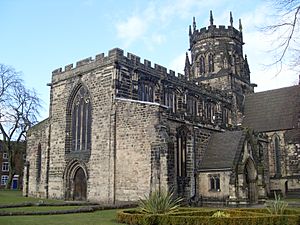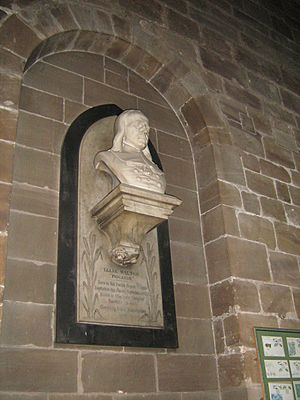St Mary's Church, Stafford facts for kids
Quick facts for kids St Mary’s Church, Stafford |
|
|---|---|

St Mary’s Collegiate Church, Stafford
|
|
| 52°48′21.36″N 2°07′06.97″W / 52.8059333°N 2.1186028°W | |
| OS grid reference | SJ 92135 23203 |
| Location | Stafford, Staffordshire, |
| Country | England |
| Denomination | Church of England |
| Churchmanship | Anglo-Catholic |
| Website | stmarysstafford.org.uk |
| Architecture | |
| Heritage designation | Grade I listed |
| Administration | |
| Parish | Stafford St Mary |
| Deanery | Stafford |
| Archdeaconry | Stoke-on-Trent |
| Diocese | Diocese of Lichfield |
St Mary's Church is a very old and important parish church in Stafford, England. It is a Grade I listed building, which means it is considered so special that it is protected by law. The church has a rich history that stretches back hundreds of years.
Contents
The History of St Mary's Church
The main parts of St Mary's Church were built in the early 1200s. Over the next few centuries, other parts were added, like the tall tower in the 1400s. But the history of this spot goes back even further. In 1954, archaeologists discovered the remains of an Anglo-Saxon church right next to St Mary's. This older church was dedicated to a saint named Bertelin.
A Church with Royal Connections
For much of its early history, St Mary's was a special type of church called a "collegiate church." This meant it was run by a group of priests, known as canons, instead of just one. It was also a Royal Peculiar, which gave it a direct connection to the king or queen. This meant the local bishop had no power over it.
This special status caused some trouble. In December 1258, a new bishop, Roger de Meyland, arrived in Stafford with armed men. They forced their way into the church and attacked the priests inside because the bishop wanted to be in charge.
The church remained a collegiate church until 1548. At that time, the government closed many religious institutions like this one across England.
Later History and Restoration
After the 1500s, the Aston family became important supporters of the church. An interesting fact is that the family became Roman Catholic in the 1620s, but they continued to support St Mary's, which was part of the Church of England. This shows they were respected in the community, no matter their personal faith.
By the 1800s, the old church was in need of major repairs. Between 1841 and 1844, a famous architect named Sir George Gilbert Scott was hired to restore it. He carefully repaired the building, making sure to preserve its historic character for future generations.
Memorials and Famous Burials

Inside the church, you can find several monuments and tombs dedicated to important people from Stafford's history. These memorials help us remember them.
Some of the people remembered here are:
- Sir Edward Aston, who died in 1568. He has a large chest tomb.
- Thomas and Barbara Clifford, who both died in the 1780s.
- Humphrey Hodgetts, who died in 1730.
- Izaak Walton, a famous writer who died in 1683.
Other notable people buried at St Mary's include Edward Stafford, 3rd Baron Stafford and Walter Aston, 2nd Lord Aston of Forfar.
The Organs of St Mary's
St Mary's Church has two amazing pipe organs. The main organ is a very large instrument built in 1909 by the famous organ builders Harrison and Harrison. It is so historically important that it has been given a Grade I certificate from the British Institute of Organ Studies.
The church also has a second, older organ. This one was first installed in 1790 by John Geib. It has been rebuilt and updated over the years to keep it in good playing condition.
See also
- Grade I listed buildings in Staffordshire
- Listed buildings in Stafford (Central Area)
- List of collegiate churches in England

